

What Does It Really Matter If Companies Are Tracking Us Online? Dept. of Homeland Security Forced to Release List of Keywords Used to Monitor Social Networking Sites. Prince Harry naked pic. Plaintiff has to turn over emotional social media content in employment lawsuit. Court holds that Facebook, LinkedIn and MySpace postings relating to plaintiff’s emotional state must be produced in discovery.
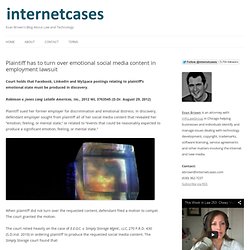
Robinson v. Jones Lang LaSalle Americas, Inc., 2012 WL 3763545 (D.Or. August 29, 2012) Plaintiff sued her former employer for discrimination and emotional distress. In discovery, defendant employer sought from plaintiff all of her social media content that revealed her “emotion, feeling, or mental state,” or related to “events that could be reasonably expected to produce a significant emotion, feeling, or mental state.” When plaintiff did not turn over the requested content, defendant filed a motion to compel. Month where Apple, Facebook killed their brands. What on earth is going on at Apple and Facebook?
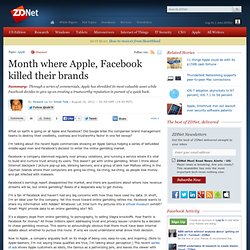
Did Google bribe the companies' brand management teams to destroy their credibility, coolness and trustworthy factor in one fell swoop? I'm talking about the recent Apple commercials showing an Apple Genius helping a series of befuddled middle-aged men and Facebook's decision to enter the online gambling market. Facebook--a company slammed regularly over privacy violations, and running a service where it's vital to build and nurture trust among its users. PODCAST: Debating web privacy with Facebook and Google.
Author Explores The Evolution Of Facebook. The Facebook Effect: The Inside Story of the Company That Is Connecting the WorldBy David KirkpatrickHardcover, 320 pagesSimon & SchusterList price: $26.00 Oscar Morales was fed up.
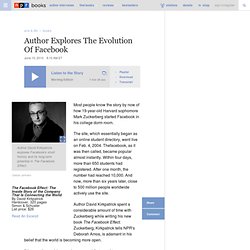
It was holiday time in his hometown of Barranquilla, Colombia, just after the 2008 new year. The gentle-spirited civil engineer with a gift for computers was spending his days at the bucolic nearby beaches with his extended family. But despite the holidays, like much of the country his thoughts were dark, and occupied with the suffering of a little boy named Emmanuel. Emmanuel was the four-year-old son of Clara Rojas, who had been a hostage in the jungles of Colombia for six years. Sympathy and sadness about the plight of FARC's hostages was an ever-present fact in contemporary Colombia, as was fear about what the powerful and murderous revolutionary army might do next to disrupt the country.
But as the new year arrived, Emmanuel still hadn't been freed.
FB. FB places. Is social networking stealing your privacy? Demand your dot.rights! - Online Writing - Entertainment - YouReader.com. Get Out Of My Facebook - Media, Telecoms, IT and Entertainment - United Kingdom. Terms & Conditions and Privacy Statement Mondaq.com (the Website) is owned and managed by Mondaq Ltd and as a user you are granted a non-exclusive, revocable license to access the Website under its terms and conditions of use.
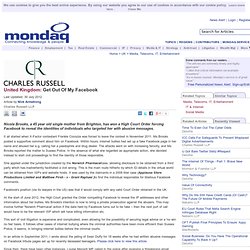
Your use of the Website constitutes your agreement to the following terms and conditions of use. Mondaq Ltd may terminate your use of the Website if you are in breach of these terms and conditions or if Mondaq Ltd decides to terminate your license of use for whatever reason. Use of www.mondaq.com You may use the Website but are required to register as a user if you wish to read the full text of the content and articles available (the Content). Disclaimer Mondaq Ltd and/or its respective suppliers make no representations about the suitability of the information contained in the documents and related graphics published on this server for any purpose. Registration To allow you to personalize the Mondaq websites you are visiting.
Information Collection and Use Cookies Links. Facebook vs. LinkedIn: Which has the better privacy? - Computerw. Computerworld - Privacy advocates' criticism over recent moves by Facebook and Google Buzz begs the question: Is privacy possible in a social network?
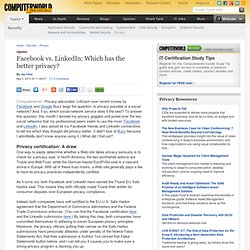
And, if so, which social-network service does it the best? To answer this question, this month I donned my privacy goggles and pored over the two social networks that my professional peers seem to use the most: Facebook and LinkedIn. I also asked all my Facebook friends and LinkedIn connections to tell me which they thought did privacy better. Can privacy, social media and business get along? - Tamar Weinbe. Social network users found to endanger privacy. About 52 percent of social-network users post their full birth date, home addresses, vacation plans or other personal information that could increase their risk of becoming victims of identity theft or other computer crimes, according to a survey released today by Consumer Reports magazine.
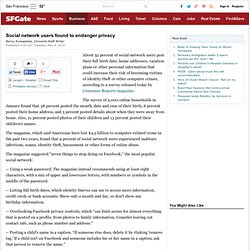
The survey of 2,000 online households in January found that 38 percent posted the month, date and year of their birth, 8 percent posted their home address, and 3 percent posted details about when they were away from home. Also, 21 percent posted photos of their children and 13 percent posted their children's names. The magazine, which said Americans have lost $4.5 billion to computer-related crime in the past two years, found that 9 percent of social network users experienced malware infections, scams, identity theft, harassment or other forms of online abuse.
Government Uses Social Networking Sites for More than Investigations. Court Rules on Social Media Sites' Privacy Settings: The Cutting Edge of IP. On May 26th, the U.S.
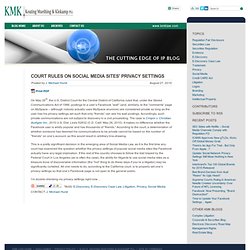
District Court for the Central District of California ruled that, under the Stored Communications Act of 1986, postings to a user’s Facebook “wall” (and, similarly, to the “comments” page on MySpace – although nobody actually uses MySpace anymore) are considered private so long as the user has his privacy settings set such that only “friends” can see his wall postings. Accordingly, such private communications are not subject to discovery in a civil proceeding. The case is Crispin v. Christian Audigier Inc., 2010 U.S. Dist. This is a pretty significant decision in the emerging area of Social Media Law, as it is the first time any court has examined the question whether the privacy settings of popular social media sites like Facebook actually have any legal implication.
A Revised Taxonomy of Social Networking Data. Lately I've been reading about user security and privacy -- control, really -- on social networking sites.
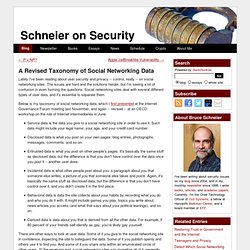
The issues are hard and the solutions harder, but I'm seeing a lot of confusion in even forming the questions. SXSW: Is Privacy on the Social Web a Technical Problem? Updated How to deal with user privacy on social networks as they grow, mature and become more sophisticated has been a frequent topic of conversation at this year’s SXSW — and not just in researcher Danah Boyd’s keynote address that argued aggregating public information can be a privacy breach, and slammed Google and Facebook for their missteps with users’ expectations.
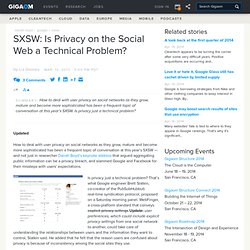
Is privacy just a technical problem? That’s what Google engineer Brett Slatkin, co-creator of the PubSubHubbub real-time syndication protocol, proposed on a Saturday morning panel. WebFinger, a cross-platform standard that conveys explicit privacy settings Update: user preferences, which could include explicit privacy settings from one social network to another, could take care of understanding the relationships between users and the information they want to control, Slatkin said.